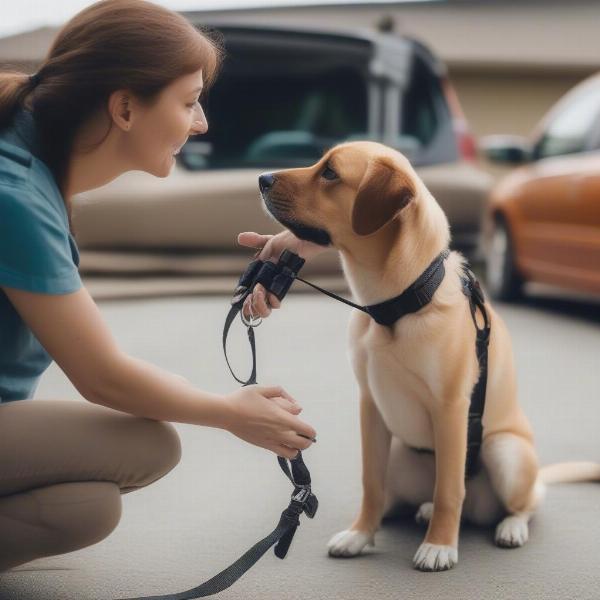A car harness for dogs is more than just a travel accessory; it’s a vital piece of safety equipment that can protect your furry friend in the event of an accident. Whether you’re taking a short trip to the vet or embarking on a cross-country adventure, ensuring your dog is securely restrained is paramount. Choosing the right harness can be confusing, with a wide array of styles and features available. This guide will walk you through everything you need to know to select the perfect car harness for your canine companion.
Types of Car Harnesses for Dogs
There are several types of car harnesses designed for dogs, each with its own pros and cons. Understanding these differences is key to making an informed decision.
Crash-Tested Harnesses
Crash-tested harnesses are specifically designed and rigorously tested to withstand the forces of a collision. They offer the highest level of protection and are recommended for all dogs traveling in cars. These harnesses distribute the impact force over a larger area of the dog’s body, reducing the risk of serious injury.
Step-in Harnesses
Step-in harnesses are easy to put on and take off. While convenient, not all step-in harnesses are crash-tested, so it’s essential to check the manufacturer’s specifications before purchasing.
Vest Harnesses
Vest harnesses provide a snug and secure fit, distributing pressure evenly across the dog’s chest and back. Many vest harnesses are crash-tested, making them a popular choice for car travel.
How to Choose the Right Size and Fit
Selecting the correct size and fit is crucial for your dog’s safety and comfort. A harness that is too loose can allow your dog to escape in an accident, while a harness that is too tight can restrict breathing and cause discomfort. Always measure your dog carefully according to the manufacturer’s instructions before purchasing a harness.
Measuring Your Dog
Measure your dog’s girth (around the chest, behind the front legs) and neck circumference. Use these measurements to consult the size chart provided by the manufacturer.
Checking the Fit
Once you have the harness, make sure it fits snugly but not too tightly. You should be able to fit two fingers between the harness and your dog’s body.
safety harness for dogs in the car
Attaching the Harness to the Car
Most car harnesses attach to the car’s seatbelt system. Some harnesses come with a dedicated seatbelt attachment, while others use the car’s existing seatbelt. Always follow the manufacturer’s instructions for proper installation.
Using a Seatbelt Attachment
If the harness comes with a seatbelt attachment, simply clip it onto the car’s seatbelt latch.
Using the Existing Seatbelt
If the harness uses the existing seatbelt, thread the seatbelt through the designated loops on the harness.
Getting Your Dog Used to the Harness
Introduce the harness gradually to avoid stressing your dog. Start by letting your dog sniff and explore the harness. Then, try putting the harness on for short periods, gradually increasing the duration. Reward your dog with treats and praise to create a positive association with the harness.
 A dog being introduced to a car harness
A dog being introduced to a car harness
Conclusion
A car harness for dogs is an essential investment for any responsible pet owner. By choosing the right harness and ensuring a proper fit, you can significantly improve your dog’s safety and comfort while traveling in the car. Remember to always prioritize crash-tested harnesses and follow the manufacturer’s instructions for installation and use.
FAQ
- What is the best type of car harness for dogs? Crash-tested harnesses offer the highest level of protection.
- How do I measure my dog for a car harness? Measure your dog’s girth and neck circumference.
- How do I get my dog used to wearing a car harness? Introduce the harness gradually and use positive reinforcement.
- Can I use a regular harness as a car harness? No, regular harnesses are not designed for car travel and may not protect your dog in an accident.
- How often should I replace my dog’s car harness? Replace the harness after any accident or if it shows signs of wear and tear.
- Where should my dog sit in the car when wearing a harness? The back seat is generally the safest place for a dog in a car.
- Can I leave my dog unattended in the car while wearing a harness? No, it is never safe to leave a dog unattended in a car, even for short periods.
front attaching harness for dogs
ILM Dog is your trusted global resource for all things dog-related. From breed selection to health, training, and nutrition, we provide expert advice and practical tips to help you provide the best possible care for your furry companion. With a focus on safety and well-being, we cover a wide range of topics including car harnesses, ensuring your travels together are safe and enjoyable. Contact us for expert advice: Email: [email protected], Phone: +44 20-3965-8624. Visit ILM Dog for more information.